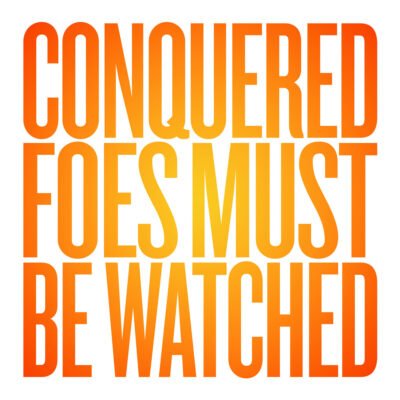Survivor: “You saw what he did to me. Why didn’t you say anything?”Enabler: “I didn’t want to get involved. Besides, it’s not like he meant to
Survivor: “You saw what he did to me. Why didn’t you say anything?”
Enabler: “I didn’t want to get involved. Besides, it’s not like he meant to hurt you.”
Survivor: “Not getting involved IS being involved. You protected him.”
Enabler: “I just didn’t want to pick sides.”
Survivor: “You already did.”
We have been fed a lie.
An entire lot of them.
In too many stories, we’re taught that enablers are just misguided, weak-willed people swept up in the influence of an abuser. That if they could just see the light—just leave the abuser’s side—they would become the good, decent people they were meant to be.
That’s a myth.
Enablers are not innocent bystanders. They are co-conspirators. They don’t just allow abuse to happen—they help make it possible. They reinforce it, spread it, protect it, and even escalate it. They may not always be the ones throwing the first punch, but they hold the victim down while it happens.
Here’s how enablers actively participate in abuse:
1. They Enforce the Abuser’s Rules
Abuse doesn’t exist in isolation. It needs a structure, a system, a network. Enablers serve as the enforcers, making sure the victim stays in line. They tell you to be quiet, not to make waves, not to ‘cause trouble.’ They remind you—explicitly or implicitly—that if you resist, there will be consequences.
2. They Are the Abuser’s Eyes and Ears
Enablers aren’t just loyal; they’re spies. They report back to the abuser, telling them what you’ve said, what you’ve done, whether you’re getting too independent, too bold, too strong. They collect information that can be used to punish you.
3. They Make It Harder for You to Leave
An abuser alone is dangerous, but an abuser with an army of enablers is a fortress. Enablers help isolate you. They make sure you have nowhere to turn. They convince friends and family to cut you off, tell you that no one will believe you, or spread rumors to damage your reputation.
4. They Do the Abuser’s Dirty Work
Sometimes the abuser doesn’t have to lay a hand on you—because their enablers will do it for them. Enablers harass, threaten, intimidate, and punish on behalf of the abuser. They may be the ones who spread lies about you, sabotage your opportunities, or outright bully you into submission.
5. They Reward Loyalty and Punish Dissent
Enablers create a world where siding with the abuser is the safest option. They reward those who go along with the abuse—offering protection, approval, or even material benefits. But if you resist? You’re an outcast, a problem, a target.
6. They Pretend to Be Neutral—But Only to Benefit the Abuser
Some enablers love to play the role of the ‘reasonable’ one. They claim they don’t want to ‘take sides’ or that ‘both sides have a point.’ But neutrality in the face of abuse is just another form of participation. And when push comes to shove, their ‘neutrality’ always protects the abuser, never the victim.
7. They Gaslight and Manipulate to Keep the Abuse Hidden
An enabler’s job isn’t just to support the abuser—it’s also to convince the world that no abuse is happening at all. They downplay the harm, rewrite history, and tell the victim they’re imagining things. They make sure the abuser’s version of events is the one that sticks.
8. They Only ‘Switch Sides’ When It Benefits Them
In fiction, we love a redemption arc. We love the idea that the moment an enabler steps away from an abuser, they instantly transform into a good and moral person.
But in reality? Many enablers only abandon an abuser when it’s no longer convenient to stand by them. When the abuser loses power, when the tide of public opinion turns, when the enabler realizes their own reputation is at risk—that’s when they jump ship.
But leaving an abuser doesn’t automatically make an enabler a good person. It just means they’re looking out for themselves.
9. They Protect the Abuser Even After the Abuse Is Exposed
Even when the truth comes out, enablers rarely turn on the abuser completely. They make excuses. They push for forgiveness. They insist that the abuser ‘has suffered enough.’ They try to silence the victim under the guise of ‘moving on.’
Because their priority was never justice. It was never accountability. Their priority was, and always will be, protecting the system that benefited them.
The Truth About Enablers
We can’t change what we will not face.
We need to stop pretending that enablers are just passive observers caught in the crossfire of abuse. They are not neutral. They are not bystanders. They are active participants.
And when we fight to hold abusers accountable, we must also hold enablers accountable. Because without them, abuse wouldn’t thrive. Without them, abusers wouldn’t have the power to continue.
Enablers don’t just make abuse possible. They make it stronger, more insidious, and harder to escape.
And that is something we can never afford to forget.
* In order to take down an abuser you have to take down the enablers too.
10 Ways Women Are Coerced in Daily Life—And Why It’s a Problem
Bullies and Cowards: A Natural Alliance in the Abuse of Women and Vulnerable Adults
6 Common Behaviors of Female Enablers of Abusive Males (infographic)